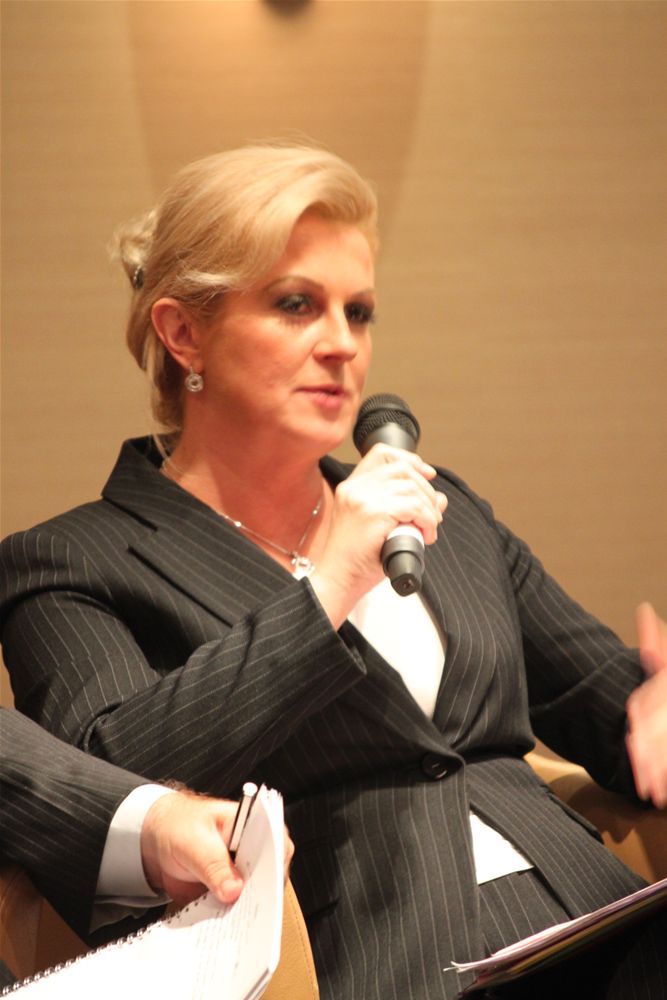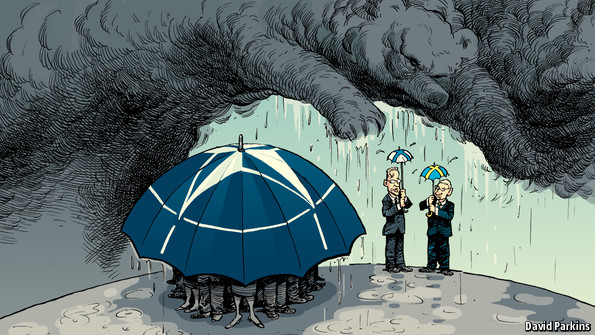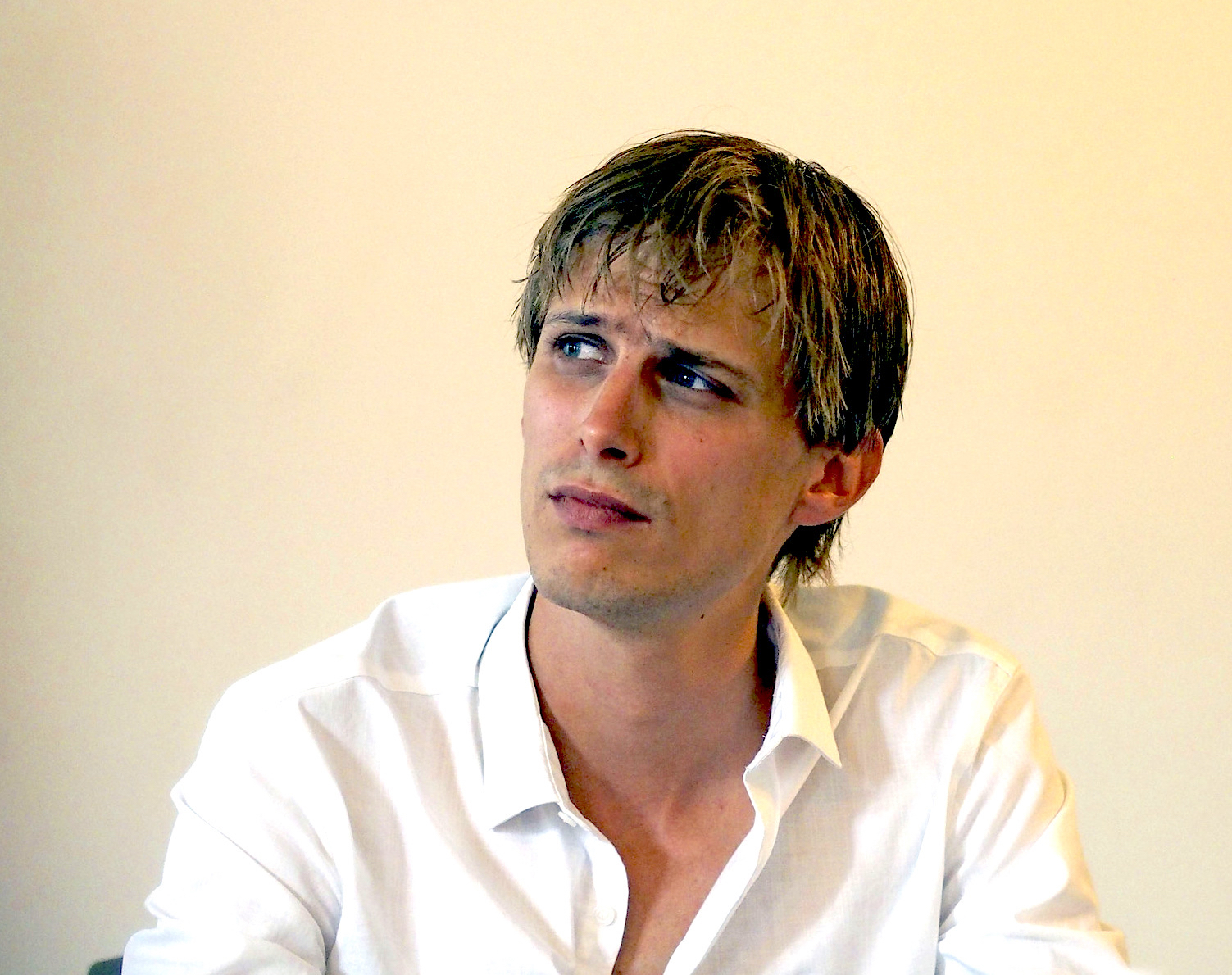Q1: How can NATO better engage the media and make use of academia and the think-tank community as strategic communicators and force multipliers?
Amb. Grabar-Kitarovic : I think we’re doing the best that we can, but we’re a division of 100 people who are divided into three different sections. Our problem is really a lack of resources: both human and financial resources. I think we need more resources. Then secondly, as an organization, just like any government, depending on what kind of organization—we are a political-military one—it affects your credibility in the sense that people think that they’re just selling propaganda and things like that. And that’s why engaging the so-called third-party validators is very important. It might be media, they have important reporting. Key opinion formers: they have their own opinion, they have their work, their research. So what we do is: we give them an opportunity to learn more about NATO, to come to NATO for different seminars, groups. We send them different things from NATO: our decisions, our conclusions, our programmes. We take them to places such as Afghanistan. And those actually have been very successful because those who visit Afghanistan tend to change completely their opinion of Afghanistan. Most people have a preconception that is created by the media, who by nature, tend to focus on spectacular attacks, assassinations, on what will sell the news. And good news doesn’t make the news. So that’s what we’re trying to do: to present a more realistic picture.
Speaking about Afghanistan, just yesterday, we launched a website called Return to Hope (www.returntohope.com). It tells stories about Afghanistan through the eyes of people who either lived there their entire lives or came there to do something. Basically, the best way is to use all communication possibilities from peer-to-peer contact to online social media, etc.—to send the message out, to send the material out, and then allow for this discussion, this debate to take place within those loose networks or interest groups and multiply the messages that way. One example would also be when we organize a conference, we make sure that there’s a process preceding it. So before the Summit, we wanted to engage the young people and we had several competitions. One of them was engaging the youth, as one of the three groups, who was working on our Transatlantic Declaration, who are giving their input. Another aspect is, we’ll have the Young Leaders Summit, and they were also selected through competition. So there is a process that precedes and they have a summit that debates these issues and we podcast it or we broadcast it depending on the nature of the conversations. And then we expect that there will be a follow-up process. These people will stay in touch with us and with each other. And they will remain interested and concerned with security issues. And they will raise these issues within their own communities when they go back.
Q2: In a 2012 survey; in Europe only 66% of those surveyed had a positive view of NATO vs. 85% in North America. Is it a communications strategy that would account for this gap in perception across the Atlantic?
Amb. Grabar-Kitarovic: There are different surveys and most of them demonstrated that there isn’t much of a difference when it comes to NATO. I would say that 66% in favour or viewing positively is a huge number. I mean, look at any government, they would be overjoyed to have the 66% approval rates. So I wouldn’t say ‘only’ [66%], I would say that this is a positive sign, that people are taking security more and more seriously and they are realizing the need for NATO to stay around and to continue changing, as the security environment changes and the nature of the threats that we’re facing changes. We’re talking in this conference today about traditional security threats but also about cyber and heard some very interesting stories about cyberthreats that affect each and every one of us. And you can basically lose everything, you can lose your identity online, within seconds. So we need to be able to be ready and be ready to respond to these challenges: prevent attacks, deter attacks, educate people, make them aware of the possibility of an attack. Even with terrorist attacks, if we are vigilant citizens, if you report that there is a bag over there, that somebody left, to the authorities, you may prevent a terrorist attack. So we really need to take things seriously. And it’s not overreacting. When it comes to security, you cannot overreact. It’s better to have a false alarm, than to have a tragedy develop.
Q3: During your speech today, you mentioned that recent events today recall past events in Bosnia-Herzegovina and also in Croatia, could you expand on the parallel?
Amb. Grabar-Kitarovic: So many similarities. The same pretexts of protecting the rights of Russian-speaking populations—at the time, it was a different nation. The same kind of propaganda, isolating people, putting them under complete information isolation and feeding them that propaganda that scares the heck out of them, [misinforming them] that they would be slaughtered and killed by the government in Zagreb or Kiev right now. That their rights would be taken away. And when people don’t have outside sources of information and recycle what they get, it becomes very dangerous because they start to believe that. And then, they become, at the same time, victims and aggressors. Victims of that manipulation but then aggressors because they then join that movement, that rebellion against the legally-elected authorities and they undermine the state system, and the very foundation of peace, security, and stability in their own country. And that’s how war developed in Croatia and later on in Bosnia-Herzegovina, by this heavy nationalistic-based propaganda that referred to WWII, to Nazism and Fascism. Just like we’re seeing now with propaganda that comes out of Russia, intended to manipulate Russian-speaking populations in Eastern and other parts of Ukraine.
The NATO Council of Canada would like to thank Forum Europe, especially Event Development Executive Jessie Atkinson and her colleagues for their outstanding work in organizing the conference ‘NATO: a Credible Security Provider? Strengthening European Security and Defence Capabilities within the Alliance.’




